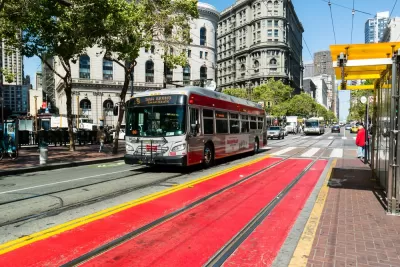The U.S. Environmental Protection Agency wants to force the state of California to spend highway money on public transit, because of the environment.

The Trump administration seems to love to antagonize California, mostly by revoking or weakening environmental regulations, like the recent episode of President Trump announcing via Twitter that California would no longer have a Clean Air Act waiver to require higher emission standards from car companies. Since the beginning of the Trump administration, the state of California has responded to the president's agenda with lawsuit after lawsuit. California also sued to keep its Clean Air Act waiver.
In recent weeks, however, the dynamic has changed, and the Trump administration has begun antagonizing California with threats of environmental enforcement. First, President Trump threatened to punish California with an environmental violation if it didn't take aggressive action to curb homelessness. Late in the day on October 2, the Trump administration followed through on that threat, as reported by Kurtis Alexander and Dominic Fracassa.
More recently, the Trump administration threatened to force the state to spend money intended for highways on public transit instead.
"The Environmental Protection Agency on September 23 threatened to start enforcing long-dormant Clean Air Act provisions that would force many regions in California to stop building new highway projects and instead either transfer that money to mass transit projects or else lose it entirely," reports Jeff Davis.
Davis notes the weirdness of the whole situation: "This sounds like a headline that would have occurred in the Obama Administration during its more ambitious first term, but no, this was in fact the Trump Administration."
The threat is predicated on the letter of the Clean Air Act law, as described clearly by Davis. The letter of the law also means the state wouldn't entirely lose the money, but could be forced to spend it on transit instead of roads.
FULL STORY: EPA Threatens to Make California Transfer Highway Funding to Mass Transit Projects

Alabama: Trump Terminates Settlements for Black Communities Harmed By Raw Sewage
Trump deemed the landmark civil rights agreement “illegal DEI and environmental justice policy.”

Planetizen Federal Action Tracker
A weekly monitor of how Trump’s orders and actions are impacting planners and planning in America.

The 120 Year Old Tiny Home Villages That Sheltered San Francisco’s Earthquake Refugees
More than a century ago, San Francisco mobilized to house thousands of residents displaced by the 1906 earthquake. Could their strategy offer a model for the present?

In Both Crashes and Crime, Public Transportation is Far Safer than Driving
Contrary to popular assumptions, public transportation has far lower crash and crime rates than automobile travel. For safer communities, improve and encourage transit travel.

Report: Zoning Reforms Should Complement Nashville’s Ambitious Transit Plan
Without reform, restrictive zoning codes will limit the impact of the city’s planned transit expansion and could exclude some of the residents who depend on transit the most.

Judge Orders Release of Frozen IRA, IIJA Funding
The decision is a victory for environmental groups who charged that freezing funds for critical infrastructure and disaster response programs caused “real and irreparable harm” to communities.
Urban Design for Planners 1: Software Tools
This six-course series explores essential urban design concepts using open source software and equips planners with the tools they need to participate fully in the urban design process.
Planning for Universal Design
Learn the tools for implementing Universal Design in planning regulations.
Clanton & Associates, Inc.
Jessamine County Fiscal Court
Institute for Housing and Urban Development Studies (IHS)
City of Grandview
Harvard GSD Executive Education
Toledo-Lucas County Plan Commissions
Salt Lake City
NYU Wagner Graduate School of Public Service





























